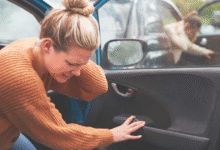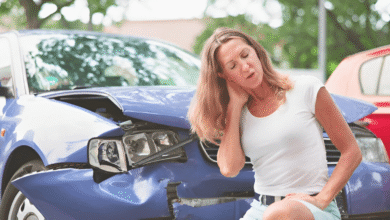What to Do After a Car Accident: A Step-by-Step Guide
What to do after a car accident: Follow this step-by-step guide to ensure safety, handle insurance claims, and protect your rights.

It’s essential to know what to do following an automobile collision in order to safeguard your safety and legal rights. Anyone can be involved in an accident, and understanding what to do in those stressful situations can help a lot. If you ever find yourself in such a regrettable circumstance, this article tries to give you a detailed and easy-to-follow plan of action.
Having a step-by-step approach can help you manage the aftermath of a Car Accident successfully, even though it might be daunting at times. This book provides all you need to know, from making sure everyone is safe to handling legal issues and insurance claims. You may handle the situation with confidence and lessen the worry and confusion that frequently precede auto accidents by following these guidelines.
What to Do After a Car Accident
Check for Injuries
The first and foremost priority is safety. Check yourself and your passengers for any injuries. If anyone is hurt, avoid moving them and wait for medical professionals to arrive.
Move to a Safe Location
If the accident is minor and the vehicles are drivable, move them to the side of the road to avoid blocking traffic and causing further accidents. Turn on your hazard lights to alert other drivers.
Call Emergency Services
Contact the Police
No matter how minor the Car Accident may seem, it’s essential to call the police. They will document the scene and create an official report, which will be crucial for insurance claims and legal purposes.
Inform Medical Services
If anyone is injured, call for medical assistance immediately. Even if injuries seem minor, it’s better to be safe and have professionals assess the situation.
Exchange Information
Gather Driver Details
Exchange names, contact information, and insurance details with the other driver(s) involved. This information is vital for your insurance claim and any potential legal action.
Note Vehicle Information
Write down the make, model, and license plate number of all vehicles involved. This helps in accurately documenting the incident.
Document the Scene
Take Photos and Videos
Use your smart-phone to take photos and videos of the Car Accident scene from multiple angles. Capture the damage to all vehicles, any road conditions, and relevant traffic signs or signals.
Record Witness Statements
If there are any witnesses, ask for their contact information and a brief statement of what they saw. Witnesses can provide crucial third-party accounts that support your version of events.
Notify Your Insurance Company
Provide Accurate Details
Report the accident to your insurance company as soon as possible. Provide them with all the details and documentation you’ve gathered. Be honest and precise to avoid complications later on.
Understand Your Coverage
Review your insurance policy to understand what is covered and what is not. This will help you navigate the claims process more effectively.
Seek Medical Attention
Immediate Medical Check-up
Even if you feel fine, it’s wise to get a medical check-up immediately after an Car Accident. Some injuries, like whiplash or internal bleeding, may not be immediately apparent.
Follow-Up Appointments
Schedule follow-up appointments if necessary. Keeping track of your health post-accident is crucial for your recovery and any potential injury claims.
Keep Records of Everything
Medical Records
Maintain detailed records of all medical visits, treatments, and expenses. These documents are essential for insurance claims and potential legal cases.
Repair Estimates
Get written estimates for vehicle repairs from reputable mechanics. Keep all receipts and invoices related to the Car Accident.
Understand Your Legal Rights
Consult with a Lawyer
If the Car Accident involves significant damages, injuries, or legal complexities, consult with a personal injury lawyer. They can provide valuable guidance and ensure your rights are protected.
Know the Statute of Limitations
Be aware of the statute of limitations for filing a claim in your state. This varies by location and can affect your ability to seek compensation.
Repair Your Vehicle
Choose a Reputable Repair Shop
Select a repair shop that is trusted and has good reviews. Your insurance company may have recommendations or requirements for repair shops.
Understand Repair Costs
Make sure you understand the costs involved in repairing your vehicle. Get multiple estimates if necessary to ensure you’re getting a fair price.
Address Emotional Impact
Recognize Trauma Symptoms
Car Accident can be traumatic. Be aware of symptoms such as anxiety, depression, or PTSD. These are common and should be taken seriously.
Seek Professional Help
Don’t hesitate to seek professional help if you’re struggling emotionally. Therapists and counselors can provide support and coping strategies.
Prevention for the Future
Defensive Driving Tips
Avoid distractions such as using your phone, eating, or adjusting the radio while driving. Keep your eyes on the road and be aware of your surroundings. Follow the “three-second rule” to ensure a safe distance between your car and the vehicle in front of you. Increase this distance in adverse weather conditions or heavy traffic. Regularly check your mirrors and look over your shoulder before changing lanes. Adjust your mirrors properly to minimize blind spots.
Regular Vehicle Maintenance
Schedule regular check-ups with a mechanic to ensure your vehicle is in good working condition. Address any potential issues before they become major problems. Regularly check oil, coolant, brake fluid, and transmission fluid levels. Top up or change fluids as needed to keep your vehicle running smoothly. Check tire pressure monthly and keep tires inflated to the recommended levels. Inspect tire tread for wear and replace tires if they are worn out or damaged. Have your brakes inspected regularly and replace brake pads or discs as needed. Listen for any unusual noises when braking, as these can indicate a problem.
Read More: How to Find the Right Lawyer in New Mexico: Tips and Tricks
Conclusion
Although handling the aftermath of an Car Accident can be difficult, being aware of what to do can help tremendously. You can protect yourself, obtain important information, and confidently handle the legal and insurance procedures by following this step-by-step instructions. Never forget to put your health and safety first, and don’t be afraid to ask for professional assistance when you need it.
By being proactive, you can greatly lessen the anxiety and bewilderment that frequently follow Car Accident. You can deal with the circumstance more skillfully and concentrate on getting better and moving on if you’re organised and knowledgeable. Drive carefully, stay safe, and be ready for anything unexpected when you’re out on the road.
FAQs
What should I do immediately after a car accident?
Ensure everyone’s safety, call emergency services, and gather information. Document the scene and contact your insurance company as soon as possible.
How long do I have to report an Car Accident to my insurance company?
You should report the Car Accident to your insurance company as soon as possible. Most policies require reporting within a specific timeframe, usually within a few days.
What information should I collect at the scene of an Car Accident?
Collect names, contact information, insurance details, vehicle information, and witness statements. Take photos and videos of the scene as well.
Can I handle the accident claim without a lawyer?
For minor accidents, you may be able to handle the claim on your own. However, for significant damages or injuries, consulting a lawyer is advisable.
How can I cope with the emotional aftermath of a Car Accident?
Recognize trauma symptoms and seek professional help if needed. Talking to a therapist can help you manage anxiety, depression, or PTSD resulting from the Car Accident.










